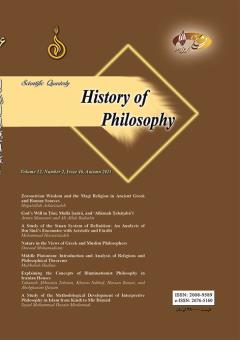God’s Will in Ṭūsī, Mullā Ṣadrā, and ‘Allāmah Ṭabāṭabā’ī
Subject Areas : Comparison of philosophical thoughts within the Islamic traditionArmin Mansouri 1 * , Ali Alahbedashti 2
1 - PhD candidate of Islamic Philosophy and Kalam , University of Qom
2 - Professor at Islamic Philosophy and Kalam Department, University of Qom, Qom, Iran
Keywords: God’s Will, essential, Actual, Khwājah Naṣīr al-Dīn Ṭūsī, Mullā Ṣadrā, ‘Allāmah Ṭabāṭabā’ī,
Abstract :
The howness of God’s Will is one of the problems that has provoked a lot of discussion in the field of theology. Although all philosophers have accepted God’s Will as a Divine Attribute, there are several disagreements in its interpretation. The purpose of this paper is to investigate, compare, and evaluate the views of Khwājah Naṣīr al-Dīn Ṭūsī, Mullā Ṣadrā, and ‘Allāmah Ṭabāṭabā’ī in terms of the semantics, origin, and ontology of God’s Will. Ṭūsī maintains that will is the same as motive, which is the same as knowledge of the goodness of act, and thus believes in God’s essential will as an essential attribute. Mullā Ṣadrā also adds the sameness of love with will to the sameness of the knowledge of goodness of act with act and introduces will as an essential attribute. Moreover, he justifies the Infallible Imam’s narrations regarding the sameness of will with act by changing its meaning from having the intention to perform an act to the making and changing of its level from essence to the level of actual existents. However, ‘Allāmah Ṭabāṭabā’ī views the identity of free will with the knowledge of the best system as a verbal conflict and a merely different denomination. He disagrees with equating free will with any essential attribute (such as love) other than knowledge. Thus he maintains that free will is not an essential attribute but is, rather, abstracted from the level of act and is one of its attributes. He also introduces the essence of an act that occurs in the outside or the presence of perfect cause for the act as its source of abstraction. It seems that ٬Allāmah’s change of ontological view of free will and considering it an actual attribute in justifying rational constraints are more accurate than regarding it as an essential attribute without paying attention to the conceptual difference between free will and knowledge and love, which has been propounded by Ṭūsī and Mullā Ṣadrā.
قرآن کریم.
حلی، حسن بن یوسف (1413) کشفالمراد فی شرح تجرید الاعتقاد، تصحيح حسن حسنزاده آملی، قم: مؤسسة نشر اسلامی.
خاتمی، احمد (1370) فرهنگ علم کلام، تهران: صبا.
راغب اصفهانی، حسین بن محمد (1412) مفردات الفاظ القرآن، بیروت: دار القلم.
سجادی، سیدجعفر (1373) فرهنگ معارف اسلامی، ج1، تهران: دانشگاه تهران.
شیروانی، علی (1388) ترجمه و شرح کشف المراد، ج1، قم: دارالعلم.
صلیبا، جمیل؛ صانعی درهبیدی، منوچهر (1366) فرهنگ فلسفی، تهران: حکمت.
صدوق، محمد بن علی (1398ق) التوحید، قم: مؤسسة نشراسلامی.
طباطبایی، سيدمحمدحسین (1999) الرسائل التوحیدیة، بیروت: مؤسسة النعمان.
طباطبایی، سيدمحمدحسین (1392) نهایة الحکمه، قم: مرکز مدیریت حوزههای علمیه.
طباطبایی، سيدمحمدحسین (1390ق) المیزان فی تفسیر القرآن، ج1، بیروت: مؤسسة الاعلمی بالمطبوعات.
طباطبایی، سيدمحمدحسین (1981م) «تعليقات» در ملاصدرا، الحکمه المتعالیه فی الاسفار العقلیه الاربعه، بیروت: دار احیاء التراث العربی.
طوسی، نصيرالدين (1383) اجوبة المسائل النصیریة، تهران: پژوهشگاه علوم انسانی و مطالعات فرهنگی.
فرحات، هانی (1389) اندیشههای فلسفی و کلامی خواجه نصیرالدین طوسی، ترجمة غلامرضا جمشیدنژاد، تهران: میراث مکتوب.
قرشی بنایی، علی اکبر (1412) قاموس قرآن، ج3، تهران: دار الکتاب الاسلامیه.
مصباح یزدی، محمدتقی (1374) آموزش فلسفه، ج2، تهران: سازمان تبلیغات اسلامی.
ملاصدرا (1381الف) المبدأ و المعاد، تصحيح و تحقيق محمود ذبيحي و جعفر شاهنظري، تهران: بنیاد حکمت اسلامی صدرا.
ملاصدرا (1381ب) الحکمه المتعالیه فی الاسفار الاربعة، ج6، تصحيح و تحقيق احمد احمدي، تهران: بنیاد حکمت اسلامی صدرا.

